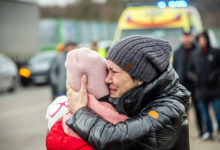Bosnia and Herzegovina: UN rights chief urges leaders to ‘turn the page on rhetoric’
 Leaders in Bosnia and Herzegovina must abandon divisive policies and focus on building an inclusive future for all, UN human rights chief Michelle Bachelet said on Friday in the capital, Sarajevo, concluding an official visit to the country.
Leaders in Bosnia and Herzegovina must abandon divisive policies and focus on building an inclusive future for all, UN human rights chief Michelle Bachelet said on Friday in the capital, Sarajevo, concluding an official visit to the country.
The four-day mission marked the first visit by a UN human rights High Commissioner in more than two decades, and she noted that some of the same rights challenges from that era persist today.
Ms. Bachelet hailed an “unprecedented ruling” handed down this week, sentencing three people for incitement to hatred for singing songs threatening violence.
“There is no place for hate speech on any grounds,” she said. “As Bosnia and Herzegovina readies for the election in October, I encourage all politicians to turn the page on rhetoric and policies of division, to focus on promoting the rights of everyone across the country, and to build an inclusive and democratic future, based on equality of all citizens.”
Painful memories, persistent discrimination
Bosnia and Herzegovina was the scene of heavy fighting during the ethnic conflicts that plagued the Balkans region following the fall of the former Yugoslavia in the 1990s.
Horrific crimes were committed, including mass rape and the massacre of some 8,000 mainly Muslim men and boys in Srebrenica by Bosnian Serb forces.
“The scars from the 1992-95 conflict are deep. The memories are still painful. But after my visit, I am convinced that there is a will and determination among many to achieve a society where all citizens, across the country, can enjoy peace and be treated equally, with respect and dignity,” said Ms. Bachelet.
The UN rights chief met with a wide range of people in the country, including senior officials and parliamentarians, representatives from the international community and civil society, as well as families of victims of the conflict.
Most of those she met expressed concern about persistent discrimination based on various grounds, though primarily related to ethnicity, gender and sexual orientation, which affects civil and political rights.
“Bosnia and Herzegovina has legislation prohibiting discrimination and it is essential that it is applied across the country and by all institutions so that all forms of discrimination are effectively eliminated. The active engagement of political leaders in building an inclusive society is essential for its future,” she said.

UN PhotoA Muslim man offers prayers at his son’s grave in Vitez, in current day Bosnia and Herzegovina.
Never forget
Civil society representatives highlighted some of the difficulties they face, and concerns around protection of civic space, including online and offline threats to journalists investigating corruption or who “challenge the dominant political narratives”.
She also observed real concern for young people, “particularly as the fragmented education system, with different curricular and textbooks, has entrenched divisions and distrust among communities.”
Ms. Bachelet also recalled her moving visit to the Srebrenica-Potocari Memorial complex, where she paid homage to the victims, survivors, and families of those killed. While there, she met a woman who had lost her husband and teenage son. The husband’s remains were recovered from a mass grave, but the boy is still missing.
“She told me of the determination of the Srebrenica mothers to continue their fight to ensure the genocide will never be forgotten. We both shed tears. I share her hope that one day she will find her son’s remains, and, that we must never forget the tragedy of Srebrenica.”
Ms. Bachelet said some 7,000 people who were “disappeared” during the war are still unaccounted for as a result of the large-scale atrocities committed across the country.
Hope for justice
Although some of those responsible for war crimes, crimes against humanity and genocide are now behind bars, “many perpetrators still remain unpunished and are walking free”, she said, both there and in other countries.
“It is my hope that justice will be served on them too,” she told journalists. “With the passage of time, some may never be identified, and therefore it remains vitally important to vigorously pursue domestic criminal prosecutions, for all crimes committed during the conflict; that those found guilty are duly sentenced. It is important that countries in the region step up their cooperation in this regard.”
Responsibility for accountability
The High Commissioner reported little progress has been made in reparations to victims of atrocities. She was also concerned that courts have denied survivors’ claims for composition by imposing statutes of limitation.
“It is the responsibility of the State of Bosnia and Herzegovina to ensure accountability for past crimes, to provide reparation for survivors and families of all victims, and to lead and support healing and reconciliation. It is also the responsibility to counter denial of atrocity crimes and glorification of war criminals,” she said.



